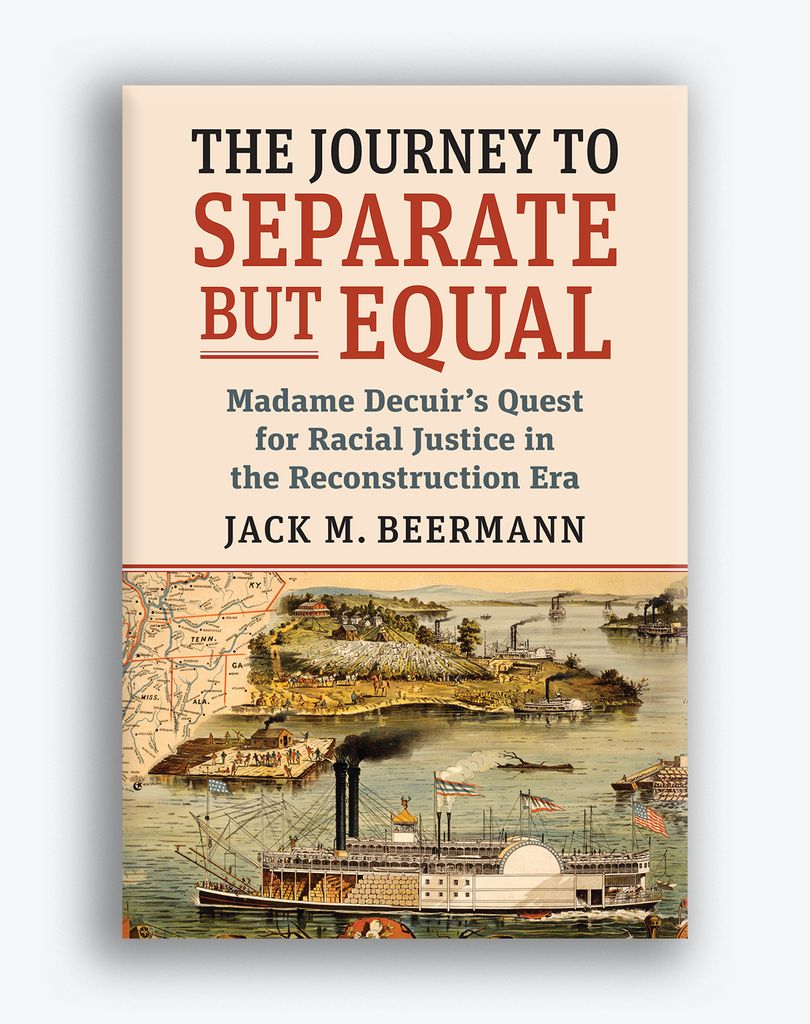Might Modern Racism Have Been Averted? New Book by BU’s Jack Beermann Probes Forgotten Court Case That Pointed United States Toward “Separate But Equal”

LAW’s Jack Beermann dissects a little-known Supreme Court case that became a legal pillar of Jim Crow in his new book, The Journey to Separate but Equal. Photo by Josh Andrus
The Forgotten Court Case That Became American Racism’s Building Block
New book by LAW’s Jack Beermann probes unknown history of “separate but equal”
Don’t be embarrassed if you’ve never heard of the Supreme Court case Hall v. Decuir. Many legal scholars haven’t, either, says Jack Beermann. But a few who have believe we might not have needed Black Lives Matter if the court had decided the case differently.

In his new book The Journey to Separate but Equal (University Press of Kansas, 2021), Beermann, a School of Law professor of law and Harry Elwood Warren Scholar, probes the 1877 decision striking down Louisiana’s nondiscrimination law. Josephine Decuir, a mixed-race woman whose free family actually had owned slaves themselves, sued a riverboat owner for denying her a stateroom in the section for whites, citing that state law, passed during Reconstruction.
SCOTUS ruled against her, accepting the owner’s argument that despite violating state law, segregation was both the custom on riverboats and a necessity to keep white patrons coming.The little-known decision “was a significant milestone in the march toward Jim Crow” and the “separate but equal” discrimination the high court was to enshrine more famously two decades later in Plessy v. Ferguson, writes Beermann, who recently spoke with BU Today about his new book.
Q&A
With Jack Beermann
BU Today: How did you learn about this case?
Jack Beermann: I was reading a scholarly article on the legitimacy of Southern state governments where white supremacists took control by force after Reconstruction. There was a footnote to Hall v. Decuir, indicating that the Supreme Court had prevented Louisiana from enforcing its anti-discrimination law. Since I study civil rights decisions from that period, I was surprised that I had never heard of the decision and was skeptical that the Court would have done that. So I went online and read the case, which confirmed what the author had said about it, and then my curiosity got the better of me.
Why did you write the book, and who did you write it for?
This project was outside of my comfort zone of doctrinal legal analysis and examination of the executive and legislative branches. I thought [it] was important enough to take a chance on, not only because of the gap in the literature, but because of the window it opens to the role the Supreme Court played in reestablishing white supremacy in the post–Civil War South and racial attitudes in Louisiana—which were different from other Southern states, due to the large number of free people of color, including the French-speaking privileged class to which Decuir belonged.
I aimed the book at five audiences: legal scholars, including law students; legal historians; scholars of American history more generally; scholars who focus on issues regarding race; and members of the general public who are interested in such things. I thought that this project would resonate with current events and the continued inability of this country to resolve its problem of race.
I tried to enrich the story with background about the lives of the parties. Some readers with a more academic bent might find this material to be distracting digressions, but I hope that most readers will find it interesting. We learn, for example, about the life of one of the earliest African American lawyers in Louisiana; the drawn-out divorce proceedings of another lawyer who claimed—falsely, according to his wife—to be descended from a cousin of George Washington; and about the false ransom note sent years later when one of the defense lawyers, a leading white supremacist, disappeared, never to be heard of again.
I thought that this project would resonate with current events and the continued inability of this country to resolve its problem of race.
Were you attracted by the morally problematic aspect of Decuir, who, while treated as a person of color, had owned slaves herself?
This made the project more problematic. Decuir came from a privileged and wealthy family; her brother was the elected treasurer of Louisiana at the time all of this occurred. In early drafts, I tried to confront the moral ambiguity inherent in Madame Decuir’s life and lawsuit, but I was dissatisfied with the results. In the end, I focused on her own sense that her treatment denied her dignity, because that, in my view, is universal—that racial oppression and racial hierarchies inherently deny human dignity to those made to suffer.
How might history have changed if the Supreme Court had ruled in Decuir’s favor?
There is a disagreement among legal historians. Some believe that decades of Jim Crow and suffering for African Americans might have been averted had the Supreme Court stood up for racial justice, while others believe that more progressive Supreme Court decisions would have been unenforceable in the face of violent white supremacist resistance across the South. I really don’t know the answer. However, my next book project is a work of fiction speculating on whether a more liberal Reconstruction-era Supreme Court, with a more accepting attitude toward civil rights for Blacks, might have managed to change history for the better.

Comments & Discussion
Boston University moderates comments to facilitate an informed, substantive, civil conversation. Abusive, profane, self-promotional, misleading, incoherent or off-topic comments will be rejected. Moderators are staffed during regular business hours (EST) and can only accept comments written in English. Statistics or facts must include a citation or a link to the citation.